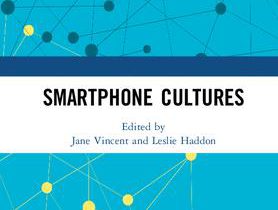Mireia Fernández-Ardèvol and Andrea Rosales have contributed with a chapter in the newly released book “Smartphone Cultures“, edited by Jane Vincent and Leslie Haddon, and published by Routledge.
The chapter, entitled Older People, Smartphones and WhatsApp, explores the specific forms of smartphone appropriation among older individuals, the tensions among values, identities and the change in interpersonal communication that come along with WhatsApp, and how they have been integrated into the everyday life of older people.
Even though data paint a picture in which mobile messaging apps are comparatively less important among older individuals in Spain, which might suggest that this is not a relevant phenomenon for the senior population, Fernández- Ardèvol and Rosales’ research shows that WhatsApp is essential in the everyday life practices of some older individuals. They identify specific forms of appropriation among older participants, such as shared smartphones between couples; and specific approaches to new digital devices, with some participants willing to get the breaking novelties and others reacting to pressures to have an smartphone – essential to support WhatsApp.
WhatsApp, a cultural artifact intrinsically linked to another cultural artifact -the smartphone, serves to analyze, from the perspective of the older people, specific forms of consumption, representation and regulation from the perspective of the circuit of culture. This research also contributes to incorporating older people into the study of digital communication from a non- patronizing perspective.
Overview of the book
Smartphone Cultures explores emerging questions about the ways in which the mobile technology and its apps have been produced, represented, regulated and incorporated into everyday social practices.
More specifically, this book engages with issues of production and regulation in the case of the digital infrastructure supporting smartphones and the development of mobile social gambling apps. It examines issues of consumption through looking at parental practices relating to children’s smartphone use, the engagement of older people with smartphones, as well as how different cultural norms of sociability have a bearing on how the technology is consumed. The smartphone’s implications for other theoretical frameworks is illustrated through examining ramifications for domestication, and the sometimes-limited place of smartphones in certain aspects of life is examined through its role in the practices of reading and writing.
This book presents the latest international research from scholars located in the UK, Europe, the US and Australia and will appeal to scholars and students of media and cultural studies, communication studies and sociologists with interests in technology and social practices.
Links:
- Full description of the book: Routledge.com

